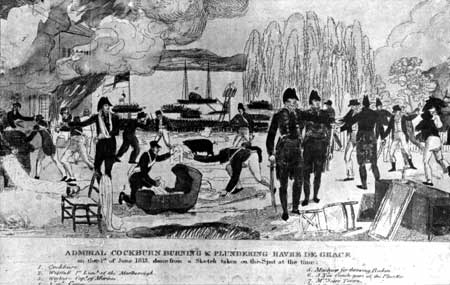|
FORT McHENRY National Monument and Historic Shrine |
 |

Early print of British raid on Havre de Grace,
June 1, 1813.
Courtesy Maryland Historical Society.
The Battle of North Point
The British strategy for the capture of Baltimore envisaged a joint land and naval attack on the city. On the morning of September 12, 1814, the troops, reinforced by the naval and marine detachments under Rear Admiral Cockburn, disembarked and began to move rapidly along the road toward Baltimore, An American defense line, unfinished and unguarded, was soon overrun. After proceeding about 5 miles, the advance elements made contact with a party of American riflemen, and in the ensuing skirmish General Ross was mortally wounded. The command devolved upon Col. Arthur Brooke who, in the opinion of a fellow officer, was "better calculated to lead a battalion, than to guide an army." Resuming their advance, the British army soon encountered the main body of Stricker's brigade drawn up along a line which Stricker had skillfully selected.
Brooke's tactics were designed to envelop both flanks of the American line, with the heaviest pressure being exerted initially on Stricker's left. As soon as he became aware of Brooke's intention, Stricker moved two regiments and additional artillery to the threatened sector. His plan to wage a determined defensive action was completely upset, however, when the unit on the extreme left, the fifty-first regiment, "delivered one random fire and retreated precipitately Although the panic spread to a few companies, the balance of the American force stood fast in the face of the approaching enemy until Stricker ordered them to fall back on the regiment which he held in reserve. The brigade retired in good order, and in compliance with arrangements previously made with Smith, Stricker posted his brigade on the left, half a mile in advance of the main defense lines of Baltimore.
Brooke spent the night on the battlefield, and on the following morning advanced his troops within 2 miles of the city, where they halted to await the naval cooperation deemed necessary for the successful occupation of Baltimore.
It is interesting to note that the British at North Point used rockets in addition to artillery pieces, but in the final analysis it was their superiority in numbers and experience which carried the day.

|
|
Last Modified: Mon, Dec 2 2002 10:00:00 am PDT |


